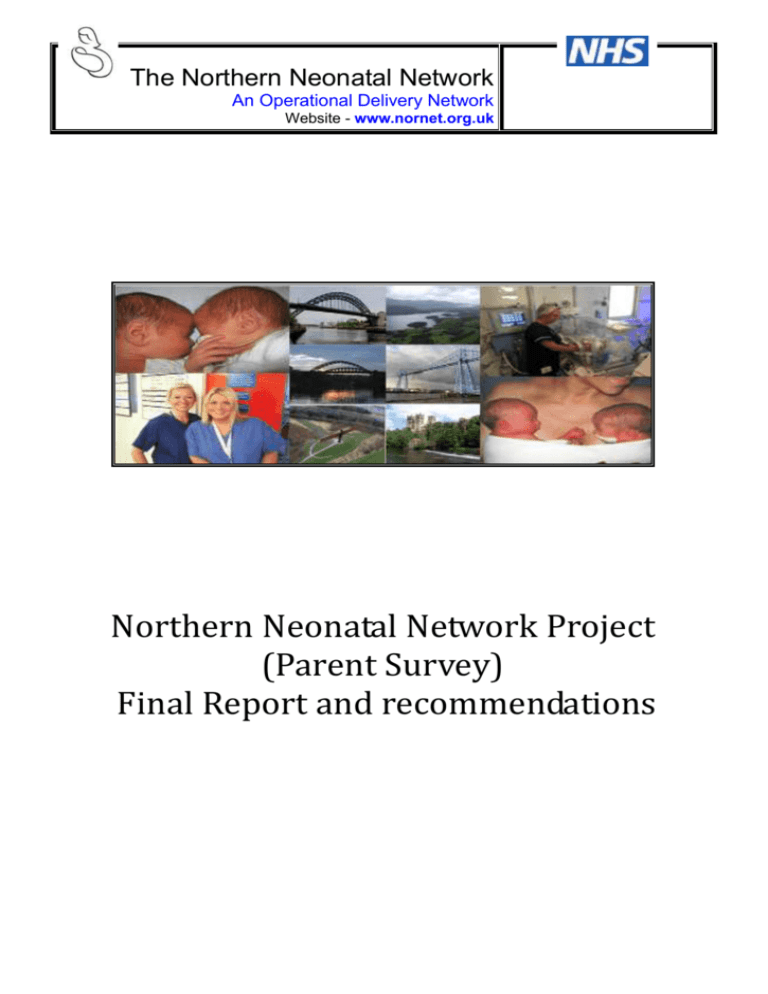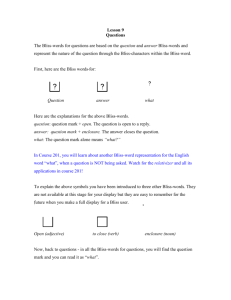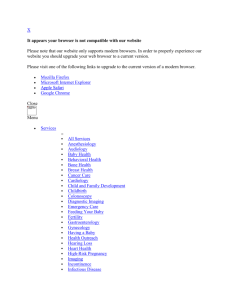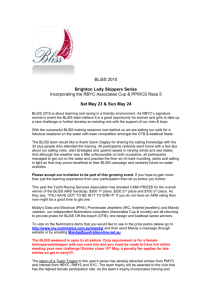here - Northern Neonatal Network
advertisement

The Northern Neonatal Network An Operational Delivery Network Website - www.nornet.org.uk Northern Neonatal Network Project (Parent Survey) Final Report and recommendations Executive Summary The purpose of the project was to collect parent/guardian views and feedback on care received while their baby was in the neonatal unit. The aim was to capture the parent perspective and experience whilst having a baby in one or more of the Northern Network units, both Neonatal Intensive Care (NICU) and Special Care Baby Units (SCBU). The survey took place from January to April 2014.The project was designed to compliment the BLISS audit tool with the aim of enhancing the care we offer our families by integrating service user feedback into practice. This Report lays out the background to the Survey, the process followed, a summary of the main findings that emerged and as a result, the subsequent recommendations for the Network Board to consider to further achieve this. Background The need for this Survey was identified in the latter part of 2013 and was agreed as a necessary initiative due to the prohibitive costs of the national Picker 2 Survey that was being publicised nationally. The Network Board agreed the need to implement a local survey that would capture current and relevant data that could inform future practice development and improvement within family centred care. Each of the 12 units within the Northern Neonatal Network was involved in distributing surveys to parents currently in their unit and at discharge and out patient appointments. The questionnaire was offered to parents in paper copy and as an online survey. We aimed to capture as many parents as possible in the small timeframe available. Each unit will hold their own data and compile a brief summary then produce an action plan to share with health professionals to inform practice. There will be an overall Network summary of findings alongside individual unit summaries. Purpose The survey was devised following consultation with the Network Board and unit leads to establish a data base of information which would be collected from parents with recent experience of care in one or more of the Northern Network 12 units, from which parent perspectives and experience could be obtained to enable improvements in care quality and to form a benchmark for future local parent surveys. The national Picker 1 survey1 offered rich data which could be used to inform practice, however as it was completed in 2010 and Picker 2 was associated with significant costs it was felt that much could be gained by undertaking a smaller scale, less costly and more personal local survey. Methodology The survey was made available in two formats and could be completed by either following a web link to Survey monkey or via a hard copy printed version that could be completed and returned in a pre- paid envelope. Consideration was given to the format of the survey and to ease completion questions were both closed and brief with an opportunity for free text and comments also available. The questionnaire was designed to be completed within a period of around 10-15 minutes. The main themes of the questionnaire were based on the findings of BLISS audits and Picker 1 results. The themes covered family centred care and facilities and resources for families, communication and support and skin to skin contact. The survey contained a mix of closed and option range questions and allowed for comments and free text in each section. For Units where a large amount of surveys were completed it was not possible to include all free text in the report however a number have been included which highlight the range of responses. Staff from each unit were asked to encourage parents to complete the survey in whichever format suited them. Tiny Lives Charity assisted in posting the online survey link on their Facebook page. The Project Lead visited 9 out of the 12 Network Units in order to support and meet staff and parents in the survey process. This was an essential and key part to the success of the project. Meeting health professionals and parents face to face and observing practice proved to be hugely beneficial in engaging support for the survey and in sharing best practice. Regular communication was made with unit leads and key personnel. There were 205 surveys completed online and 56 by post giving a total of 261 valid, completed. A total of 150 postal surveys were given proportionate to the size of the units. The survey was initially planned to run from January–March 2014 however was extended further to the end of April to maximise feedback obtained. Online surveys went straight onto the database and paper copy results were entered by Mark Green. Surveys contained no identifiable patient data and are treated confidentially. The results were collated according to in which unit(s) care was received and a summary will be provided by each unit outlining key issues and actions to be taken forward. Direct quotations from parents may be used to emphasise the parent perspective. Findings Responses were variable and did not always reflect the size and level of the unit involved therefore proving difficult in collating responses given that the richness of data was absent in those areas where returns were smaller. However, the objective was to provide an overall Network view with the opportunity for each unit to examine their individual responses and summarise findings into an action plan. Summary of returns: The number of returns from the parents showing where each baby was cared for is highlighted in the following table. It was occasionally the case that some babies were cared for in more than one Unit, so these are reflected in these totals; Returns showing at which Hospital(s) the babies were baby cared for? Royal Victoria Infirmary Sunderland Royal Hospital Wansbeck General Hospital University of Durham Hospital James Cook University Hospital University Hospital of North Tees Queen Elizabeth Hospital, Gateshead West Cumberland Hospital, Whitehaven South Tyneside District Hospital Friarage Hospital, Northallerton Cumberland Infirmary, Carlisle Darlington Memorial Hospital Out of the area Total Responses Number 194 22 21 15 15 12 10 8 7 6 5 4 3 261 % 74.3% 8.4% 8.0% 5.7% 5.7% 4.6% 3.8% 3.1% 2.7% 2.3% 1.9% 1.5% 1.1% Broad findings from the surveys returned and completed: There were several broad themes that emerged from the data. Communication was felt to be very good in most units however many parents felt that areas requiring improved communication were those of transfer to another unit/hospital and discharge. Parents wished for earlier, timelier information on repatriations or back transfer and more time to prepare for discharge from the unit. Having access to infant case notes at the cotside was seen as very positive whilst not having unrestricted access was difficult for those who had previously been in a unit where such access is available. Most respondents were satisfied with their level of involvement in day to day care and care planning although there were some inconsistencies in opportunity for skin to skin/kangaroo care. Many parents were unaware of the Bliss kangaroo care sticker documentation charts. Facilities and financial implications for families were variable from unit to unit. There was an overall view that car parking provision was inadequate and costly in most areas. Provision of facilities where parents can eat and have access to refreshments was deemed better in the smaller units within the Network. Some units lacked a room where parents can take time out away from the main waiting room/area and a toilet facility for parents. Generally there was an overall consensus that the cost of having a baby on a neonatal unit caused stress on families, although some units offered financial support. Lack of crèche facilities/play area for siblings, in the larger units, was also prevalent. Most respondents expressed the need for counselling or support whilst on the unit and following discharge. Many were unaware of the resources available whilst others were positive about peer support /buddy group, social work and psychology support where available. Recommendations Based on the Survey Results and the above broad findings, I would make the following recommendations to the Network Board to consider; Overall, consistency is required across the Network in order to meet parental needs. Whilst responses reflected excellent care within our 12 Units there are areas which are in need of improvement and Network strategies to achieve this goal put in place. Consistent and accurate information is desired by parents. Improvement in communication prior to transfer may involve developing the Network parent directory to include more detailed information, photos etc. The development of an App for parent use in the future may be possible and moves to look at this are already under way and should be supported. Encouraging parents to visit their destination Unit prior to transfer if possible would be beneficial and most importantly allowing a period of time for parents to adjust to the move. Similarly with discharge planning, this could often take place earlier in order to allow parents more preparation time and be able to receive more information and be involved in discussions and practical demonstrations etc. Equally as important is signposting parents/families to those services which offer support following discharge, such as BLISS, peer support. Buddy group support was seen as extremely beneficial in the 2 units that offer it. This model could be adopted by the remaining 10 units. Improving car parking is required and discussion with individual Trust Boards will be required if this is to be achieved. A recent BLISS report publication2 has highlighted the costs and burdens placed on parents and families of babies receiving neonatal care, especially when they are inpatient in Units not local to them. The recommendation is for support to be given, including free parking for visiting parents and whilst challenging in the current financial climate, remains an objective worth aspiring to. Units that do not provide facilities where parents can eat are not adhering to BLISS Baby Charter standards3 and further improvement is required. Skin to skin opportunity and education needs to be enhanced and the use of the sticker documentation to record this should be utilised in all units. This allows an auditable trail, whilst empowering parents and improving quality of care we offer to our babies and families. I would recommend that the survey be carried out annually, now that we have a benchmark from the initial survey. However, on reflection, more engagement is required to improve the number of responses in some units. Raising awareness through posters, the Network website and engaging with motivated, enthusiastic staff would be key to success in the future, perhaps utilising the new BLISS Audit leads in each Unit. The data collected will be shared with each individual unit and I recommend that this is utilised alongside the BLISS audit tool to improve family centred care with all Units working with the Network BLISS Nurse to successfully complete the process and make best use of their data with her support where appropriate. Each unit should also be responsible for formulating an action plan in response to the findings of this Survey as outlined in their data and should include disseminating this and parental feedback to Chief executives, heads of department, all health professionals and parents. Claire Campbell, Sister, RVI & Network Project Lead for Parent Survey, July 2014. __________________________________________________________________________ References 1 Parents Experiences of neonatal care: A Report on the findings from a national survey. Howell E & Graham C, Picker Institute Europe (2011) 2 It’s not a game: the very real cost of having a premature or sick baby BLISS (2014) 3 Baby Charter Standards (2nd Editions) BLISS (2011) Appendix 1 Hard copy of the Parent Survey Questionnaire used for this Project Acknowledgements I would like to thank Martyn Boyd, Mark Green, Tiny Lives staff, and all health professionals who worked so hard to engage parents in this survey.






